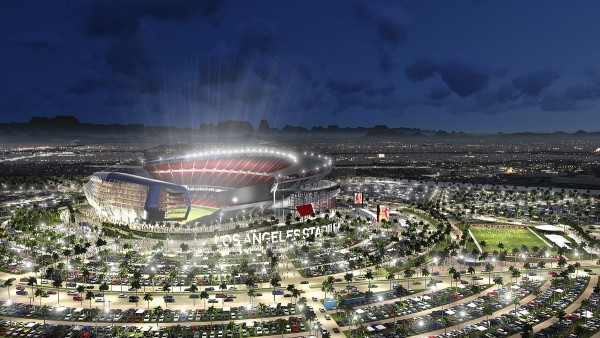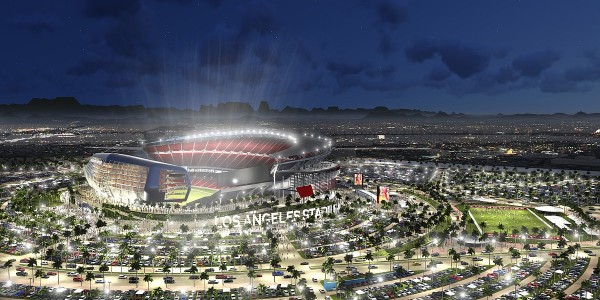
There probably isn’t a sports entity more greedy than the NFL. Tax exemptions and the use of public funding to build stadiums for privately owned teams is bad enough. But they’re not doing it on their own. Goldman Sachs are helping them along, teaching them all the necessary tricks.
Goldman Sachs, for those who don’t know, is an American multinational investment banking firm that engages in global investment banking, securities, investment management, and other financial services primarily with institutional clients. At least, that’s what the Wikipedia page says, which isn’t really getting into details of how the financial world works, especially when it holds hands with an organization like the NFL or people like NFL owners and communities desperate for a football stadium and team.
Over the last decade the banking firm has helped pro teams in over 30 deals of stadium financing. In an era in which states and cities are scared of financing stadiums for billionaires, Goldman Sachs comes in, offering Wall Street money and even better – creative deals that maximize a team’s profits and minimize its taxes. That’s where the big money is. On the side, the bank and the investors are able to pull in seven-figure returns and can even influence where franchises end up playing.
Recent endeavors have been the new Yankee Stadium in New York and the San Francisco 49ers’ new Levi’s Stadium in Santa Clara. Right now, Goldman Sachs are brokering the whole move to Los Angeles for both the San Diego Chargers and Oakland Raiders, probably sharing a stadium in Carson, planned to be the nation’s most expensive stadium.
It’s not all smooth sailing. The league might still go ahead and prefer the offer in Inglewood, which is backed by the St. Louis Rams and Stan Kroenke, the league’s second-richest owner. The Chargers, Raiders and Carson Mayor Albert Robles are counting on the money and influence of Goldman Sach’s to pave them the way to victory, and a whole lot of cash.
The Chargers initially hired the firm when a stadium in San Diego was still plausible. The plan failed, so their sights turned to Los Angeles, hoping that the blueprint of Levi’s Stadium in Santa Clara (which cost $1.3 billion) will be something that works for them again.
The Chargers got the Raiders to join in on the plans this year, after seeing the completing of the 49ers’ complex in Santa Clara go as planned. People might hate the stadium and its distance from San Francisco, but owners and bankers don’t really care about those things. Let the bloggers and Internet sheeple complain all they like.
So what’s the plan? Create a public authority to build and own the stadium, using the proceeds of a construction loan raised from private investors. The loan would be paid back using revenue from sponsorships, high-end seating and non-NFL events at the stadium and, in a two-team stadium in Carson, using as much as $800 million in personal seat licenses — upfront payments that allow fans to buy season tickets.
How does this save both teams money in the long run? Using a tax-exempt public authority to sell personal seat licenses and sponsorships allows the teams to avoid many taxes on those sales, saving them tens, perhaps hundreds, of millions of dollars. The teams also avoid property taxes on the building, although they do pay rent and other local taxes on the private use of a public facility. Public agency bonds for the stadium would be tax exempt and sell at lower interest rates.
Why does it work in Los Angeles and not San Diego? Naming rights are worth more. Suites are worth more. Sponsorships are worth more. building something similar in San Diego without generous public subsidies would require the Chargers to borrow more money at higher interest rates. The San Diego stadium task force disagrees with these assessments, but they’re probably fighting a losing battle.
Goldman’s plan in Carson leans too heavily on personal seat licenses. To raise $800 million, the Chargers and Raiders both would have to sell more seat licenses than anyone except the Dallas Cowboys and 49ers ever have — in a market where neither team has deep roots — while competing with each other. No one has ever sold that amount of [personal seat licenses] in a new market.
The Santa Clara deal generated about $75 million in interest and fees, according to financing documents, with more potentially to come when construction bonds are refinanced later this year. In Carson, where the stadium would cost $400 million more, financiers could recoup $100 million, maybe more. Los Angeles is attractive to the NFL, and it’s the same for investors. A big corporate base helps, and Goldman Sachs are happy to be the middlemen.
